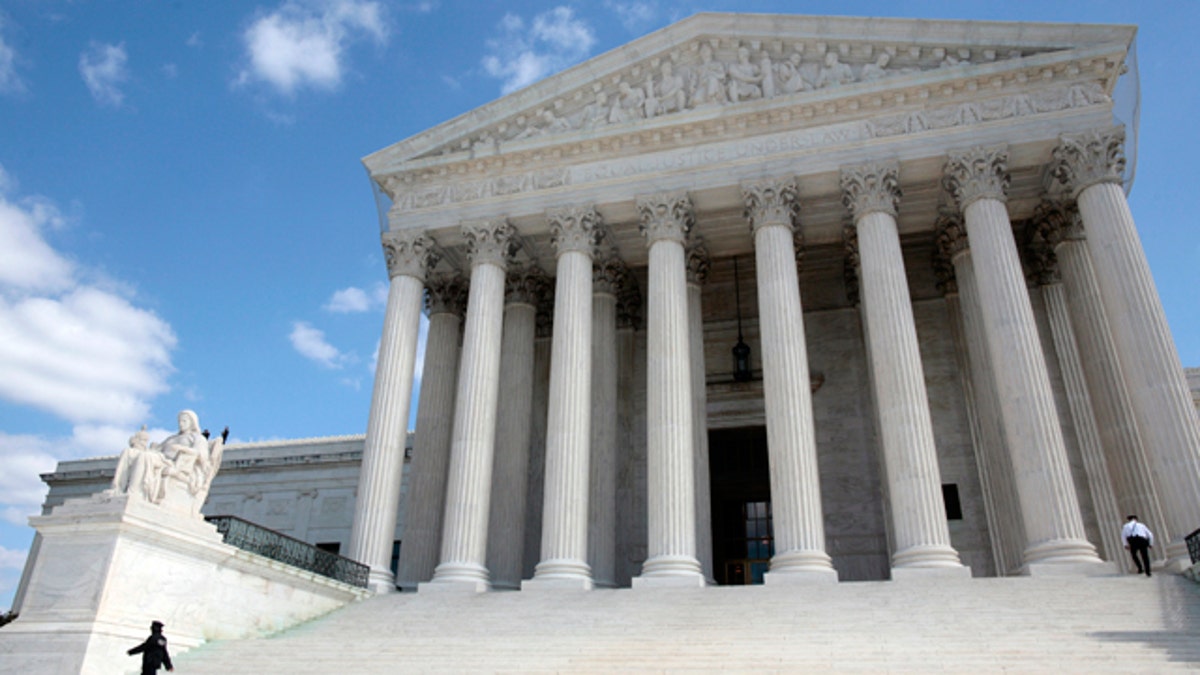
(Reuters)
Thursday, the Supreme Court will hand down its decision on the Patient Protection and Affordable Care Act, better known as "ObamaCare." What the Court will ultimately rule is yet to be seen, but one thing is clear: whatever the Court decides, it will be attacked for committing the sin of “judicial activism” by those critical of the outcome.
Indeed the Court had barely finished its oral arguments when President Obama suggested that striking down the popularly enacted ObamaCare would be an “unprecedented” act and a good example of judicial activism. He later backpedaled a bit regarding whether the court striking down a law would be unprecedented, but no such retraction regarding judicial activism was forthcoming. And it is a fair bet that if the administration loses the case, the president will double down on this “judicial activism” charge in the lead-up to the election.
But the president is not alone. Some of his critics also decry judicial decisions because they would reach bad outcomes, or flout popular will.
Given that these groups are on the opposite sides, they can’t both be right. But they can both be wrong. Indeed, each group is applying a misguided definition of judicial activism. And so, before the decision is announced and accusations of judicial activism are bandied about, it is worth pausing to consider: what is judicial activism?
Judicial activism properly refers to how a judge interprets the law, rather than the subjective desirability of the outcome of a case. It occurs when judges write subjective policy preferences into their decisions rather than interpreting the constitutional or statutory provisions according to the law’s original meaning or plain text.
In accord with President Obama’s statement, judicial activism may result in anti-democratic outcomes -- unelected federal judges usurping the role of democratically accountable legislators by putting their policy preferences above those who have been elected. It is therefore appropriate to denounce activist opinions for their antidemocratic effects. But contrary to what seemed to be the president’s suggestion, the fact that a decision is anti-democratic is not, in and of itself, judicial activism.
To illustrate this principle, if Congress passed a law banning newspapers from endorsing political candidates, a court’s decision striking down the law could be called anti-democratic, insofar as that law (like every actual law in this country) would have been popularly enacted. But such a decision would not be judicial activism, because the reasoning would be consistent with the plain text and original public meaning of the First Amendment.
Even though the decision could in some thin sense be called “anti-democratic,’ it would be consistent with the proper judicial function, because by so ruling the judge would be upholding the supermajoritarian requirements of the Constitution, which prevent a majority from trampling on First Amendment rights. By contrast, in the case of judicial activism, the majority’s will is discarded not in favor of super-majority requirements of our most basic law, but on little more than a judge’s subjective whims.
But what if the court upheld the law banning newspaper endorsements? President Obama’s “unprecedented” statement seems to accept the definition of some commentators, who define judicial activism as occurring only when laws are struck down.
This neglects that judges employ an improper method of interpretation when they apply their own policy preferences to uphold a statute or other government action which is clearly unconstitutional. Thus a judge upholding the newspaper ban -- even to achieve some purported social good (let’s say, by limiting corporate media influence) -- would be engaging in judicial activism.
Judges that stray from interpreting the Constitution or the laws according to the original public meaning often rely upon the evolution of the Constitution, which inevitably will be found to have evolved to where it supports the judge’s desired outcome in the case. Kind of convenient, actually.
And so, how can you tell if the Supreme Court issues an activist opinion in the ObamaCare decision? To answer that question, it is necessary to look not to the possible outcomes, but to the law.
The case turns on whether Congress’s authority to regulate interstate commerce would permit the federal government to force people whose defining characteristic is that they have not purchased a product -- in this case, health insurance -- to buy the product.
In order to find that Congress has the authority to compel purchases by those who are not engaged in commerce, the Court cannot rely on the plain text or original public meaning of the Constitution, because it does not support that claim of authority. And they cannot even rely on what were arguably activist prior Supreme Court decisions expanding Congress’s power. Because while those allowed Congress to reach intrastate activity, they still required Congress to be regulating activity that was commercial in nature. No, the Court will need to force the evolution of the Commerce Clause further.
A Court might find such an expansion is necessary based upon the idea that Congress “should” “must” or “needs to” have the power to address health care questions such as cost shifting and coverage for those with pre-existing conditions. But that is a very different question from the question before the Court: whether the Constitution actually grants Congress that authority.
And so, as the Court hands down its decision, remember that it is not the outcome that could make ObamaCare an example of judicial activism, or whether a popularly enacted law is struck down. Rather, what would make the decision an activist one is how the judges interpret the Constitution.
